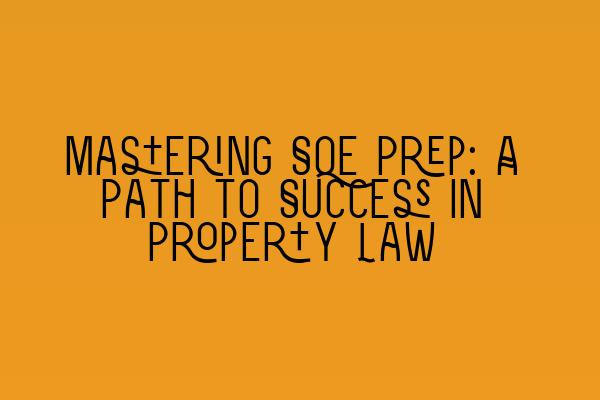Mastering SQE Prep: A Path to Success in Property Law
Are you an aspiring property law professional preparing for the Solicitors Qualifying Examination (SQE)? Congratulations on taking the first step towards a rewarding career in property law! The SQE is a comprehensive assessment that evaluates your knowledge and skills in various legal practice areas, including property law. In order to excel in this area, it is essential to have a solid understanding of the key concepts and principles in property law, as well as the ability to effectively apply them in practical scenarios.
In this blog post, we will provide you with valuable insights and tips to help you master your SQE preparation and pave your way to success in the field of property law.
1. Develop a Strong Foundation
Building a strong foundation in property law is crucial for your success in the SQE. Start by familiarizing yourself with the fundamental concepts and principles that govern property transactions. Understand the different types of property ownership, including freehold and leasehold. Additionally, delve into the intricacies of property rights, such as easements, covenants, and mortgages.
Updates in UK Property Laws: Key Changes and Implications is a comprehensive resource that provides up-to-date information on the latest changes and developments in UK property laws. This article will help you stay informed about recent legal updates and their implications for property transactions.
2. Enhance Your Legal Research Skills
Legal research skills are essential for a property law professional. Develop a systematic approach to conducting legal research, including using primary and secondary sources effectively. Familiarize yourself with online legal research databases and platforms commonly used in the legal profession. These skills will not only help you during the SQE but also throughout your career as a property lawyer.
For a comprehensive guide on legal research in property transactions, check out Legal Challenges in Property Transactions: A Comprehensive Guide. This article provides insights into the common legal challenges that arise in property transactions and offers practical tips for navigating through them.
3. Practice Realistic Scenario-Based Questions
The SQE assessment includes scenario-based questions that assess your ability to apply property law principles to practical situations. To excel in this aspect, it is crucial to practice realistic scenario-based questions that replicate the types of challenges you may encounter in real-life property law practice.
Our article on Dominate Property Law Questions: Avoiding Common Pitfalls provides valuable insights and strategies for tackling property law questions effectively. It offers tips on identifying relevant legal issues, analyzing scenarios, and providing well-reasoned answers. By practicing with realistic scenario-based questions, you can develop your problem-solving skills and boost your confidence for the SQE.
4. Stay Updated with Recent Case Law
Case law plays a significant role in property law, shaping the interpretation and application of legal principles. Stay updated with recent case law developments to understand how courts interpret property law statutes and how these interpretations may impact your practice.
For a comprehensive overview of the essential principles of land law, including recent case law developments, check out our article on Land Law Revision Tips: Ace Your Exam Preparation. This resource will help you revise the key concepts, principles, and case law that form the basis of land law in the UK.
5. Seek Professional Guidance
Preparing for the SQE can be challenging, but it doesn’t have to be a lonely journey. Seek professional guidance and support from experienced property law solicitors and tutors. They can provide valuable insights, guidance, and feedback to help you strengthen your understanding of property law concepts and excel in the SQE.
Conclusion
Mastering SQE prep in property law requires dedication, perseverance, and a strategic approach. By developing a strong foundation, enhancing your legal research skills, practicing realistic scenario-based questions, staying updated with recent case law, and seeking professional guidance, you can pave your way to success in the field of property law.
Remember, success in the SQE is not just about passing an examination—it is about acquiring the knowledge and skills that will make you a competent and effective property law practitioner. So, embark on your SQE prep journey with confidence and determination. Your hard work and perseverance will undoubtedly pay off, opening doors to a fulfilling career in property law!
